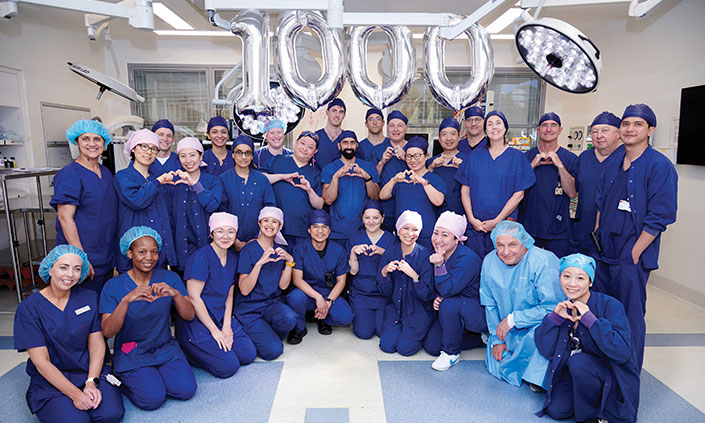Milestone for groundbreaking heart procedure
Macquarie University Hospital’s Structural Heart Team celebrates its 1000th TAVI, a procedure that revolultionised for severe aortic stenosis.

Macquarie University Hospital’s (MUH) pioneering Structural Heart Team has performed its 1000th transcatheter aortic valve implantation (TAVI), 11 years after MUH became the first private hospital in Australia to support the lifesaving procedure.
First performed in 2002, TAVI is a revolutionary procedure that has enabled the keyhole replacement of narrowed aortic valves aortic stenosis without the need for open heart surgery.
Known as aortic stenosis (AS), it is the most serious of the heart valve diseases, and also among the most common. Left untreated, severe aortic stenosis with lead to progressive debility and possibly death.
With the condition affecting one in eight Australians older than 75, it is currently estimated that there are at least 100,000 people living with severe AS.
Without treatment, about 50,000 people would die within five years.
In the past, the only option was open heart surgery, but for many patients, this was out of the question due to a combination of frailty and other health problems that meant they would be unlikely to survive such a major operation.
TAVI is a minimally invasive procedure that involves placing an expandable replacement valve in the aorta using a catheter inserted into the artery at the groin.
Patients go home one to two days after the procedure and need minimal recovery, compared to days in intensive care and weeks of rehabilitation after open heart surgery.

Interventional cardiologist Professor Martin Ng and cardiothoracic surgeon Professor Michael Wilson began doing TAVI as a research trial procedure at Sydney’s Royal Prince Alfred Hospital in 2009, with surgeons initially funding the operations from their own pockets.
Professor Ng says as more people learned of this new alternative to open heart surgery, the demand from patients for whom surgery was not an option soon overwhelmed the resources of RPAH.
“We wanted to expand the program to private hospitals to increase the number of procedures we could offer, and we approached every private hospital in Sydney in 2012,” he says.
“Only Macquarie had the vision to say yes. All the others turned us down because it was too expensive with no Medicare rebate.”
MUH went on to invest more than $5 million in its TAVI program, funding between 60 and 100 procedures a year, and enabling clinical research that has significantly advanced the field.
TAVI was finally included on the Medicare rebate schedule for high-risk patients in 2017, and MUH was among the first nationally accredited centres for this work. The TAVI Medicare rebate was eventually extended in 2022 to cover AS patients at all levels of surgical risk, including those at low risk.
“Macquarie’s commitment saved the lives of hundreds of people who no other treatment options, and in the process, it became a world leader in this evolving field,” Professor Ng says.
“By 2023, 58 per cent of all aortic valve replacements in Australia were done by TAVI, and we expect this percentage to continue to grow.
“This is a serious, life-limiting condition that can now be very easily fixed, and the methods are now being applied to other heart conditions.”
The MUH Structural Heart Team now has more than 50 members, including surgeons, cardiologists, cardiac anaesthetists, nursing, allied health and support staff, and performs about 250 structural heart procedures a year.
Macquarie’s doctors have also been world leaders in the understanding of AS and its treatment. In 2021, Professor Ng published the world’s largest ever prevalence and clinical outcomes study, providing seminal new information that highlighted the serious implications of all types of severe AS.
Professor Ng and Professor Wilson have also developed and published new ways to perform the TAVI procedure that are both safer and more effective for patients, improving the practice of TAVI worldwide.
Macquarie University Health CEO Conjoint Associate Professor Walter Kmet says MUH is extremely proud of the team and their contribution to the advancement of minimally invasive heart interventions.
“When Professor Ng and Professor Wilson first came to us, we saw this as an excellent opportunity to support an innovative new procedure that could change lives,” he says.
“Our integration with Macquarie University Medical School means MUH is also dedicated to furthering medical research and innovation.
“I believe that if we had not supported the team’s vision, it would have taken much longer for TAVI procedures to be included on the Medicare rebate scheme and become an option for people Australia-wide.
“It has been a pleasure to watch the Structural Heart Team grow and evolve into a large, highly skilled group with significant expertise in complex cardiology, surgery and patient support.”